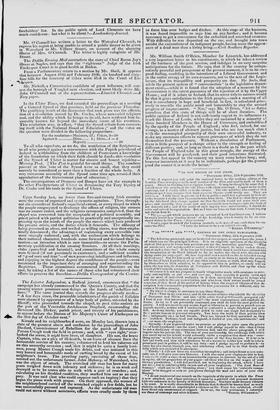Mr. William Smith O'Brien, Member for Limerick, has addressed a
very important letter to his constituents, in which he takes a review of the business of the past session, and indulges in no very sanguine anticipations for the future. Ile says, that if the country be compa- ratively peaceful and prosperous at the present moment, it is to its own good feeling, confiding in the intentions of a Liberal Government and in the native energy of its own resources, not to the acts of the Legis- lature, that its tranquillity and prosperity are due. Ile feels, that while the present system of " counteraction " in the legislative depart- ment exists,-while it is found that the adoption of a measure by the Government is the surest guarantee of the rejection of it by theUpper House ; and if it relate to Ireland, that its worst title to success would be that it gives satisfaction, to the Irish people,-such a marring of all that is consolatory in hope and beneficial in fact, is calculated griev- ously to unsettle the public mind and lamentably to stay the onward progress of improvement. " Nor," says Mr. O'Brien, " let us flatter ourselves that this state of things will be of short duration. The public opinion of Ireland is not sufficiently cogent in its influences to reach the House of Lords, whilst they are sustained by a minority of three hundred Members in the House of Commons, and emboldens& by the apathy of the People of England ; who feel, indeed, for our wrongs, as a matter of abstract justice, but who are too much elatel with the unexampled prosperity of their own successful industry, to make any strenuous efforts to remove grievances of which they do not themselves feel the pressure. Without a dissolution of Parliament, there is little prospect of a change either in the strength or feeling of different parties ; and, as long as there is a doubt as to the part which the People of England take in this great struggle, the energy of the Government will be paralyzed, and their good intentions frustrated. To this last appeal to the country we must come before long; and, however inconvenient it may be to individuals, perhaps for the general good the sooner it is made the better."


























 Previous page
Previous page